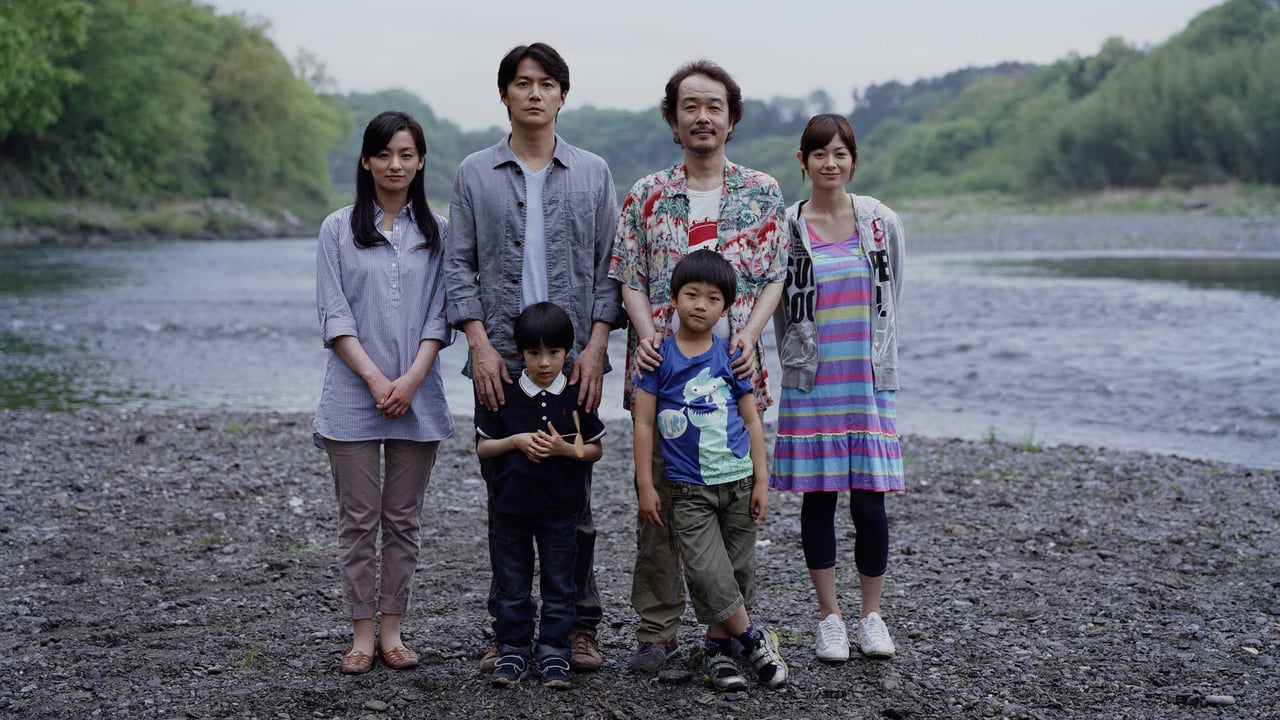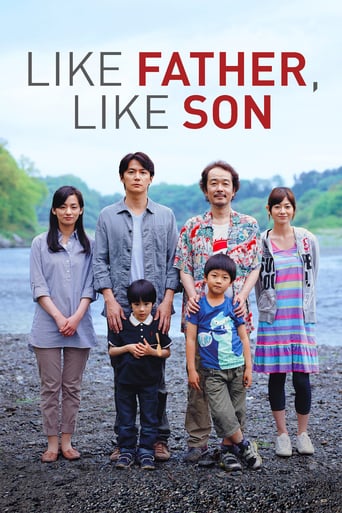



Better Late Then Never
It's hard to see any effort in the film. There's no comedy to speak of, no real drama and, worst of all.
View MoreExcellent characters with emotional depth. My wife, daughter and granddaughter all enjoyed it...and me, too! Very good movie! You won't be disappointed.
View MoreThe story, direction, characters, and writing/dialogue is akin to taking a tranquilizer shot to the neck, but everything else was so well done.
View MoreViewed on Streaming. Subtitles/translations = ten (10) stars. Director Hirokazu Koreeda (who is also credited as the sole screen writer and editor) treads much too lightly on a tale filled with dramatic possibilities. Perhaps the Director feared his story could easy degenerate into an overly melodramatic morass, since he frequently steers his film in the opposite direction resulting in trivia and wooden acting. The plot involves the revelation (after the criminal statue of limitations has expired) that male babies were deliberately switched immediately after birth. This apparently is not unusual at the local hospital that lacks basic controls to prevent these crimes. However, it does employ a lawyer who seems to specialize in such matters. The photo play deals with the discovery of, family reactions to, and "final" remediation of the issue. (Maintaining the status Quo (and minimizing the trauma) via quick reciprocal adoptions would seem like a straight-forward approach, but it is never seriously perused. Perhaps this is because it would abruptly end the story and turn the movie into a short subject!) Impact of vastly different family socioeconomic conditions (one with a rising-Salaryman-star father; the other with a small-shopkeeper father) becomes a major plot point often eclipsing the baby-switching factor (a more accurate movie title might be: "Like Family (Fortunes), Like Son"!). Koreeda seems to have focused his energy on directing his child actors (understandably, as they are usually a major challenge), and, in the process, neglected the performances of his adult actors. Further, those playing the parents in the Salaryman family are miscast. The "score" mostly consists of fragmented piano playing (the Salaryman's "son" is learning to play this instrument) which is overly done. But not completely to the point of boring irritation. Subtitles are excellent with opening and closing credits completely translated. All closing credits can be viewed just in English! An extreme rarity in Japanese films. Doumoarigatou Goziamashita! Worth watching, but don't expect too much. WILLIAM FLANIGAN, PhD.
View More'LIKE FATHER, LIKE SON': Four and a Half Stars (Out of Five)Japanese drama flick; about two families, that discover their biological sons were switched at birth (six years earlier). It was written and directed by acclaimed filmmaker Hirokazu Koreeda. The movie stars Masaharu Fukuyama, Machiko Ono, Yōko Maki, Riri Furanki, Keita Nonomiya and Shôgen Hwang. The film has been a big financial hit, in Japan; and a critical success, as well, all over the world (including several prestigious festival award wins). It's so popular, that Steven Spielberg is producing an American remake (through his DreamWorks Studios); with filmmakers Chris and Paul Weitz set to direct. I saw the movie at the OSU International Film Festival (at Darkside Cinema, in Corvallis, OR) and I was really moved by it.Ryota Nonomiya (Fukuyama) is a successful, and very conservative, businessman. He and his wife, Midori (Ono), have been raising a six-year-old together, named Keita (Nonomiya). One day, the hospital where Keita was born, informs them that Keita is not their biological son. He was switched at birth, with another six-year-old boy, named Ryusei (Hwang). Ryota and Midori decide to meet with the couple, who's been raising their son, named Yukari (Maki) and Yudai Saiki (Franky). The families begin spending a lot of time together, and each battles with the decision (they must make); whether to switch their children back, or not.The film is both beautifully shot, and powerfully acted; Koreeda appears to be a director that lives up to his respectable reputation. The most impressive performances, in my opinion, come from the two six-year-old boys (and many think that great child performances, are largely due to great directing). The movie really feels like you're watching real people, dealing with real life situations (extremely tough, and troubling ones, at that). It almost feels like you're watching a documentary; the film is that convincing. It's really slow-paced, and the lead characters are challenging to get to know (at first); but the movie is well worth it, by it's emotionally charged conclusion. It's definitely a very powerful, and well made film!Watch our movie review show 'MOVIE TALK' at: https://www.youtube.com/watch?v=Sb0-wDtevNo
View MoreOne of my most anticipated films of 2013, I haven't taken longer to watch a film I couldn't wait for at one point. It was certainly worth watching, though not the masterpiece I expected. Like Father, Like Son's hook comes from the fact that this is a real moral dilemma Japanese families have to deal with. It's something very specific to Japanese culture and the film digs deep into how sacred bloodlines are. The film is surprisingly soft in its approach, mostly focusing on the contrast between the two fathers. Hirokazu Koreeda toes a very fine line between naturalism and sentimentality but is ultimately deeply human, provoking both thought and emotion. Ideas of fatherhood are basic to cinema, but Koreeda envelopes it here without feeling derivative.8/10
View MoreIt's story of exchanging kid between two families. Accidentally, during their birth, kids were swapped between two families. Before entering the elementary school, due to medical check up, it revealed. Then two family start to negotiate among them and so on. But it's not that easy to say a 6 year old kid that they are no more their parents and he has to call "papa-mama" to someone else. At some point it turn out that to accept the truth is the hardest part in this world. And it's not true for only grown up, but for kids too. Adjustment to new surrounding and new people may be much more easier for a kid, but when we talk about changing the core relationship, it's not that adjustable.True masterpiece from Hirokazu Koreeda.
View More